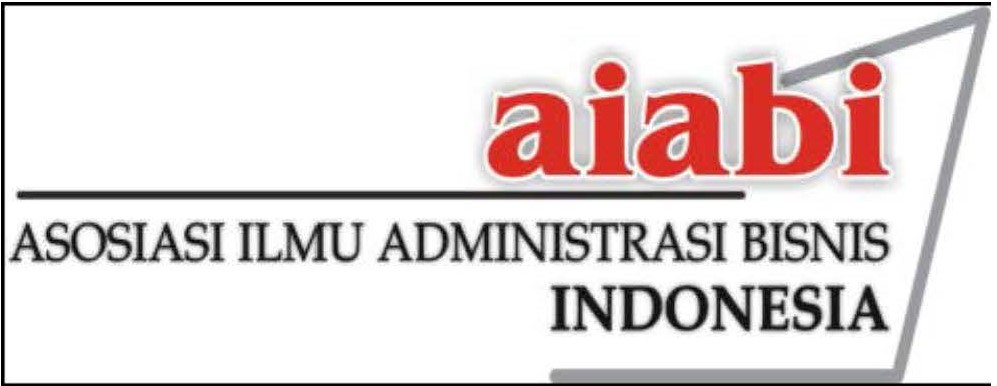PENGARUH PERSEPSI SOSIAL DAN ORIENTASI KEWIRAUSAHAAN TERHADAP NIAT WIRAUSAHA WANITA DI BANDUNG
Abstrak
Women entrepreneurs face specific problems, including social perceptions of their roles in entrepreneurship. Entrepreneurial intentions are influenced by an entrepreneur’s cognitive and psychological characteristics such as innovativeness, proactiveness, and risk-takings. This study aimed to analyze the effects of social perception and entrepreneurial orientation on women's entrepreneurial intentions. This study uses a quantitative method with structural equation modelling as an analytical technique and involves 345 women entrepreneurs who own micro, small, and medium enterprises (MSMEs) in Bandung. The sampling method used probability sampling with a simple random sampling technique. The results of this study indicate that social perception is positively and significantly related to entrepreneurial intention, either directly or mediated by entrepreneurial orientation, which is positively and significantly related to entrepreneurial orientation, and that entrepreneurial orientation is positively and significantly related to entrepreneurial intention. This study provides implications and recommendations that are discussed further, including social perception, which needs to be considered in generating entrepreneurial orientation for women to increase entrepreneurial intentions.
Wirausaha wanita dihadapkan dengan persoalan-persoalan spesifik seperti adanya persepsi sosial mengenai peran wanita dalam berwirausaha. Niat berwirausaha di pengaruhi oleh karakteristik kognitif dan psikologis seorang wirausaha, diantaranya sikap inovatif, proaktif, dan keberanian mengambil risiko. Penelitian ini bertujuan untuk menganalisis pengaruh persepsi sosial dan orientasi kewirausahaan terhadap niat berwirausaha wanita. Studi ini menggunakan metode kuantitatif dengan structural equation modelling sebagai teknik analisis dan melibatkan 345 wirausaha wanita pemilik UMKM di Kota Bandung. Metode sampel menggunakan sampel probabilitas dengan teknik sampel acak sederhana. Hasil studi ini menunjukkan bahwa variabel persepsi sosial berhubungan positif dan signifikan terhadap niat berwirausaha baik secara langsung maupun dimediasi oleh orientasi kewirausahaan; persepsi sosial juga berhubungan positif dan signifikan terhadap orientasi kewirausahaan, begitu pula orientasi kewirausahaan berhubungan positif dan signifikan terhadap niat berwirausaha. Studi ini memberikan implikasi dan rekomendasi yang dibahas lebih lanjut dalam studi ini, diantaranya menunjukkan bahwa persepsi sosial merupakan faktor yang perlu dipertimbangkan dalam membangkitkan orientasi kewirausahaan bagi perempuan dalam meningkatkan niat berwirausaha.
Kata Kunci
Teks Lengkap:
PDFReferensi
Anggadwita, G., & Dhewanto, W. (2016). The influence of personal attitude and social perception on women entrepreneurial intentions in micro and small enterprises in Indonesia. International Journal of Entrepreneurship and Small Business, 27(2–3). https://doi.org/10.1504/IJESB.2016.073974
Anggadwita, G., Luturlean, B. S., Ramadani, V., & Ratten, V. (2017). Socio-cultural environments and emerging economy entrepreneurship. Journal of Entrepreneurship in Emerging Economies, 9(1), 85–96. https://doi.org/10.1108/JEEE-03-2016-0011
Anggadwita, G., Ramadani, V., Permatasari, A., & Alamanda, D. T. (2021). Key determinants of women’s entrepreneurial intentions in encouraging social empowerment. Service Business, 15(2), 309–334. https://doi.org/10.1007/s11628-021-00444-x
Bolton, D., & Lane, M. D. (2012). Individual entrepreneurial orientation: development of a measurement instrument. Education + Training, 54(2/3), 219–233. https://doi.org/10.1108/00400911211210314
Carranza, E., Dhakal, C., & Love, I. (2018). Female Entrepreneurs: How and Why Are They Different?
Chhabra, S., Raghunathan, R., & Rao, N. V. M. (2020). The antecedents of entrepreneurial intention among women entrepreneurs in India. Asia Pacific Journal of Innovation and Entrepreneurship, 14(1), 76–92. https://doi.org/10.1108/APJIE-06-2019-0034
Chin, W. W. (2013). The partial least squares approach to structural equation modeling (G. A. Marcoulides, Ed.; 3rd ed.). Psychology Press.
Gupta, N., & Mirchandani, A. (2018). Investigating entrepreneurial success factors of women-owned SMEs in UAE. Management Decision, 56(1), 219–232. https://doi.org/10.1108/MD-04-2017-0411
Hair, J. F., Risher, J. J., Sarstedt, M., & Ringle, C. M. (2019). When to use and how to report the results of PLS-SEM. European Business Review, 31(1), 2–24. https://doi.org/10.1108/EBR-11-2018-0203
Hair, J. J., Sarstedt, M., Hopkins, L., & G. Kuppelwieser, V. (2014). Partial least squares structural equation modeling (PLS-SEM). European Business Review, 26(2), 106–121. https://doi.org/10.1108/EBR-10-2013-0128
Henseler, J., Ringle, C. M., & Sarstedt, M. (2015). A new criterion for assessing discriminant validity in variance-based structural equation modeling. Journal of the Academy of Marketing Science, 43(1), 115–135. https://doi.org/10.1007/s11747-014-0403-8
Ika, A. (2018, January 18). 7 Tantangan yang Harus Dikalahkan oleh Wirausaha Wanita. Https://Ekonomi.Kompas.Com/Read/2018/01/18/090000126/7-Tantangan-Yang-Harus-Dikalahkan-Oleh-Wirausaha-Wanita-?Page=all.
Israr, M., & Saleem, M. (2018). Entrepreneurial intentions among university students in Italy. Journal of Global Entrepreneurship Research, 8(1), 20. https://doi.org/10.1186/s40497-018-0107-5
Jana, S. K., Das, B. C., Manna, S. S., Payra, T., Maiti, A., & Paul, P. Kr. (2019). Women entrepreneurship in backward region: A study in Jhargram District of West Bengal. Asian Journal of Multidimensional Research (AJMR), 8(3), 222–233. https://doi.org/10.5958/2278-4853.2019.00099.5
Jena, R. K. (2020). Measuring the impact of business management Student’s attitude towards entrepreneurship education on entrepreneurial intention: A case study. Computers in Human Behavior, 107, 106275. https://doi.org/10.1016/j.chb.2020.106275
Kementerian Koperasi dan UKM Indonesia. (2018). Perkembangan Data Usaha Mikro, Kecil, Menengah (UMKM) dan Usaha Besar (UB) Tahun 2018 - 2019. Https://Www.Kemenkopukm.Go.Id/Uploads/Laporan/1617162002_SANDINGAN_DATA_UMKM_2018-2019.Pdf.
Kumairoh. (2019, May 6). Kepala Bappenas Tegaskan Peran Perempuan dalam Pembangunan Indonesia. Https://Www.Wartaekonomi.Co.Id/Read226514/Kepala-Bappenas-Tegaskan-Peran-Perempuan-Dalam-Pembangunan-Indonesia.
Martins, I., & Perez, J. P. (2020). Testing mediating effects of individual entrepreneurial orientation on the relation between close environmental factors and entrepreneurial intention. International Journal of Entrepreneurial Behavior & Research, 26(4), 771–791. https://doi.org/10.1108/IJEBR-08-2019-0505
Masa’deh, R., Al-Henzab, J., Tarhini, A., & Obeidat, B. Y. (2018). The associations among market orientation, technology orientation, entrepreneurial orientation and organizational performance. Benchmarking: An International Journal, 25(8), 3117–3142. https://doi.org/10.1108/BIJ-02-2017-0024
Mastercard. (2018, September 25). Mastercard Global Destination Cities Index 2018. Https://Www.Mastercard.Com/News/Ap/En/Newsroom/Press-Releases/En/2018/September/Mastercard-Global-Destination-Cities-Index-2018-Half-of-Top-10-Destinations-in-Index-Are-Ap-Cities/.
Nasip, S., Fabeil, N. F., Buncha, M. R., Hui, J. N. L., Sondoh, S. L., & Abd Halim, D. N. (2017). Influence of Entrepreneurial Orientation and Social Capital on Business Performance among Women Entrepreneurs along West Coast Sabah Malaysia. Proceedings of International Conference on Economics , 377–393.
Palmer, C., Niemand, T., Stöckmann, C., Kraus, S., & Kailer, N. (2019). The interplay of entrepreneurial orientation and psychological traits in explaining firm performance. Journal of Business Research, 94, 183–194. https://doi.org/10.1016/j.jbusres.2017.10.005
Singh, Kh. D., & Onahring, B. D. (2019). Entrepreneurial intention, job satisfaction and organisation commitment - construct of a research model through literature review. Journal of Global Entrepreneurship Research, 9(1), 16. https://doi.org/10.1186/s40497-018-0134-2
Thompson, C. G., Kim, R. S., Aloe, A. M., & Becker, B. J. (2017). Extracting the Variance Inflation Factor and Other Multicollinearity Diagnostics from Typical Regression Results. Basic and Applied Social Psychology, 39(2), 81–90. https://doi.org/10.1080/01973533.2016.1277529
Wang, Y., Liang, J., Yang, J., Ma, X., Li, X., Wu, J., Yang, G., Ren, G., & Feng, Y. (2019). Analysis of the environmental behavior of farmers for non-point source pollution control and management: An integration of the theory of planned behavior and the protection motivation theory. Journal of Environmental Management, 237, 15–23. https://doi.org/10.1016/j.jenvman.2019.02.070
Wazdi, A. I. (2018). Identifikasi Dimensi Entrepreneurial Intentions Pada Wanita Wirausaha (Studi Pada Anggota Ikatan Wanita Pengusaha Indonesia Cabang Kota Bandung). Jurnal Manajemen Perbankan Syariah, 2(1), 51–62.
DOI: https://doi.org/10.24198/adbispreneur.v6i3.35063
Refbacks
- Saat ini tidak ada refbacks.









